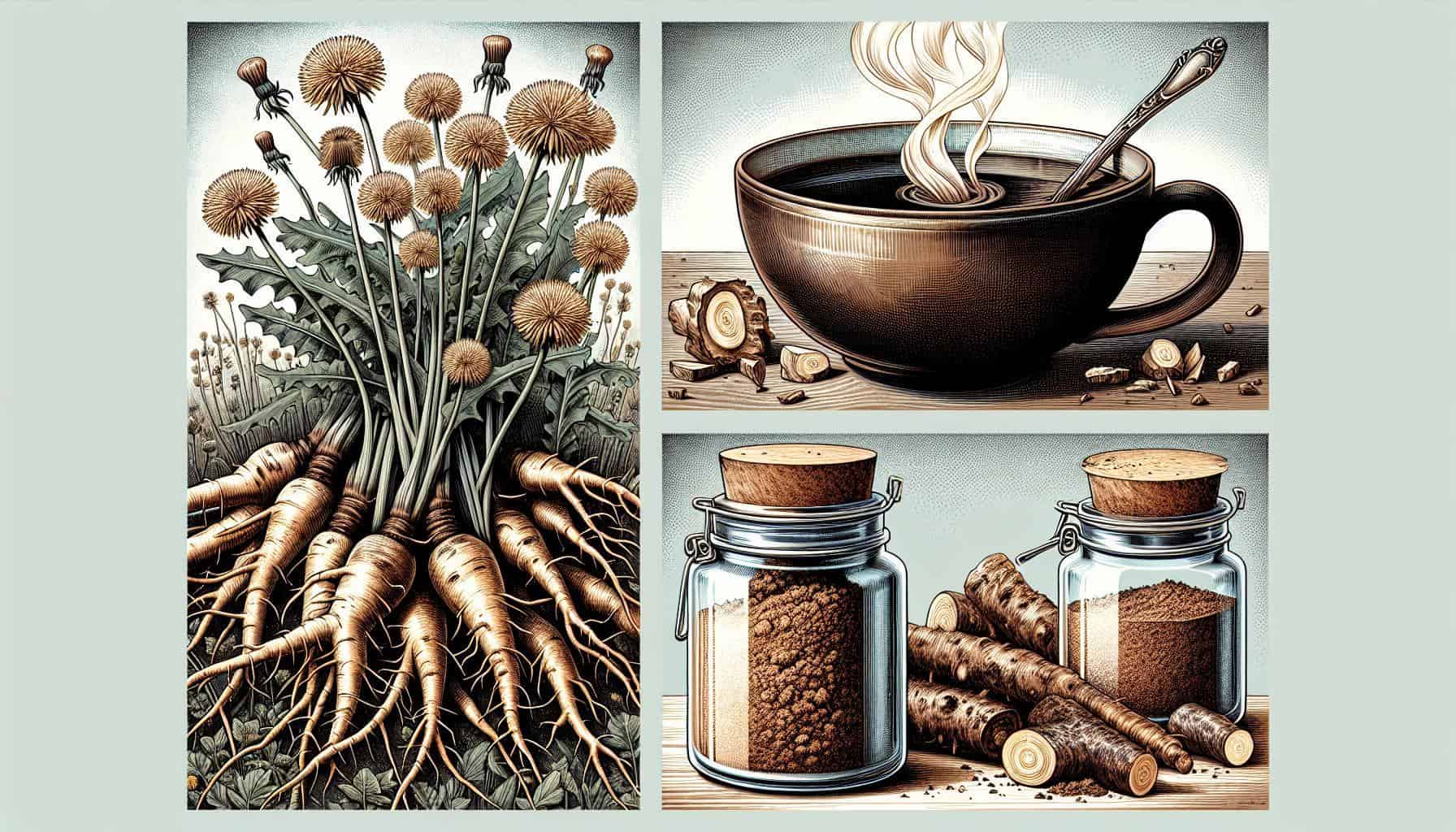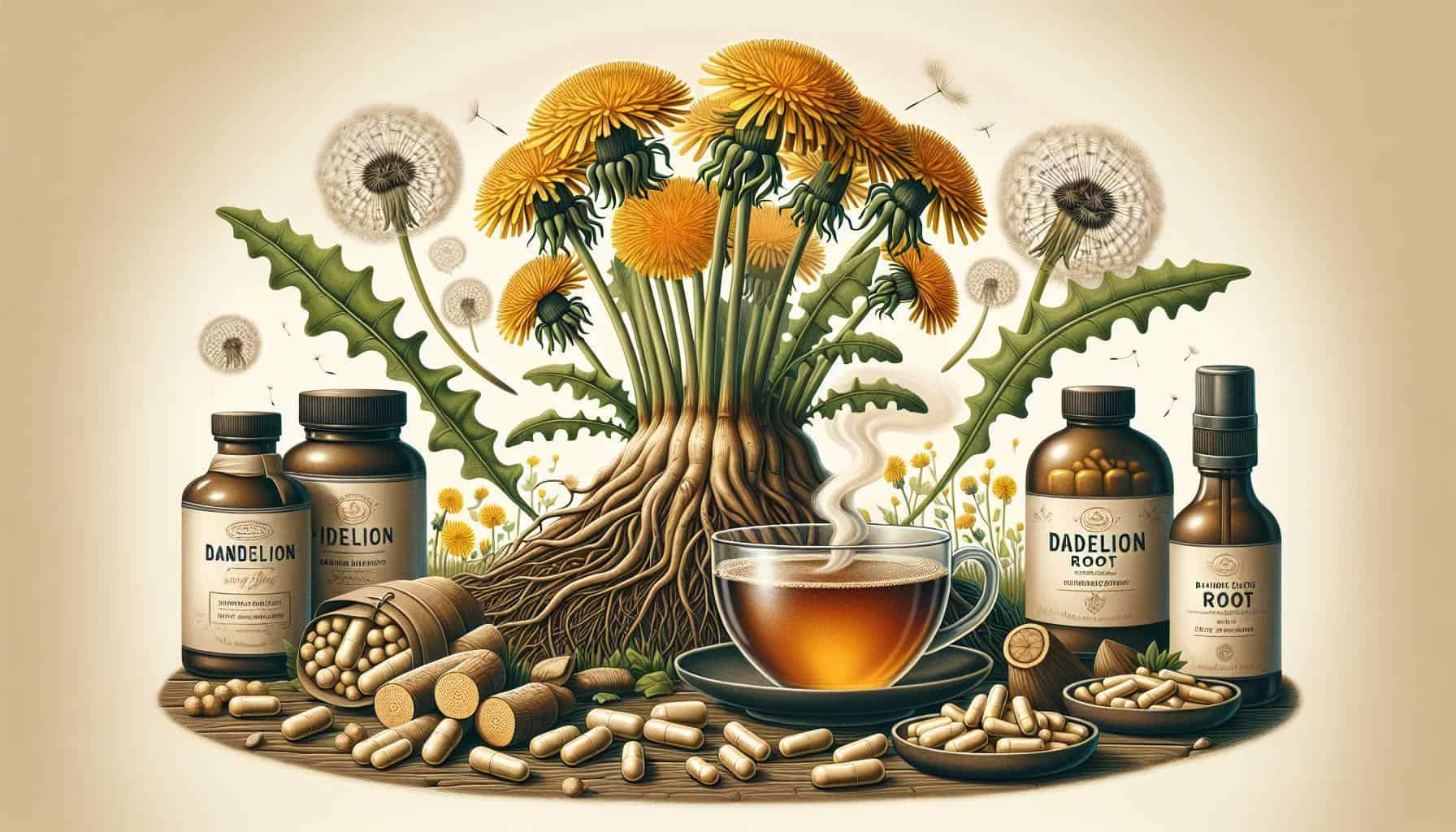Dandelion Root Benefits: Boost Liver Health & Reduce Inflammation
Dandelions are more than just pesky weeds in your garden; they’re a powerhouse of health benefits waiting to be tapped. Recognized for centuries in traditional medicine, the dandelion root, in particular, packs a punch with its unique properties.
While you might be familiar with dandelion greens in your salad, the root’s potential for boosting health is gaining traction. Herbalists have long harnessed the root to revitalize the liver and stimulate appetite. Now, it’s your turn to discover the myriad of ways dandelion root can enhance your well-being.
Understanding Dandelion Root
When you’re sipping on dandelion root tea or incorporating the root into your meals, you’re tapping into a powerhouse of nutritive benefits. Dandelions thrive in various climates, braving the cold to unfurl their yellow blossoms with each sunrise. It’s not just the vibrant flowers that capture attention—the dandelion root itself is a hidden treasure, deeply entrenched in both history and wellness practices.
Though you may turn up your nose at the pungent aroma of the milky liquid found within the brittle, fleshy dandelion roots, it’s precisely these characteristics that signify the presence of potent compounds. The bitter taste, often a marker of health-boosting properties, is what helped dandelion root earn its place in the traditional medicine cabinet, revered by healers and herbalists alike.
Let’s delve into the specifics. The dandelion root is rich in Inulin, a valuable component of your diet supporting gut health. Inulin is a soluble fiber that’s not only nourishing but also fosters a balanced gut microbiome, ensuring your digestive tract operates smoothly. Here’s a simplified look at what this root packs in terms of nutritional value:
- Soluble fiber
- Vitamins
- Minerals
- Potent antioxidants
The antioxidant capacity of dandelion root is particularly noteworthy. Antioxidants are your body’s defense warriors, neutralizing free radicals to curb the risk of chronic diseases. By incorporating dandelion root into your diet, you’re effectively buttressing your body’s natural defenses.
Beyond delivering a slew of vitamins and minerals, the root shows promise in revitalizing vital organ functions. The liver, a critical detoxifying agent in your body, benefits from the root’s properties, potentially owing to the complex array of compounds housed within this deceptively simple plant.
Take a moment to consider how dandelion root benefits can fit into your lifestyle. Whether as a tea or a crunchy addition to your meal, this versatile root offers more than meets the eye. With every part of the dandelion plant propelling your health forward, it’s clear that this common ‘weed’ is anything but ordinary.
Historical Use of Dandelion Root in Traditional Medicine
 Dandelion root has a rich legacy as a medicinal herb, with its benefits renowned across various cultures. Traditional Chinese Medicine (TCM) has recognized dandelion root’s potential since around 659 AD, with ancient texts noting its use in addressing digestive issues and inflammation. It wasn’t just TCM that valued this plant’s properties; by the 10th and 11th centuries, dandelion had also cemented its place in Arab medicinal practices, where it was referenced for its utility in various treatments.
Dandelion root has a rich legacy as a medicinal herb, with its benefits renowned across various cultures. Traditional Chinese Medicine (TCM) has recognized dandelion root’s potential since around 659 AD, with ancient texts noting its use in addressing digestive issues and inflammation. It wasn’t just TCM that valued this plant’s properties; by the 10th and 11th centuries, dandelion had also cemented its place in Arab medicinal practices, where it was referenced for its utility in various treatments.
This “weed” is much more than an uninvited garden guest. Dandelion root, filled with a bitter, milky substance, has been a staple in herbalists’ repertoires for centuries. It was traditionally harnessed as a liver cleanser, an agent to stimulate the appetite, and as a detoxifying substance for the liver and gallbladder.
Venture into the realm of European folk medicine and you’ll encounter the dandelion being revered as an “elixir of life”. Praised for its purifying effects on the body, dandelion root gained acclaim as a blood purifier and was commonly used to eliminate fatigue. In these traditions, the dandelion’s detoxifying properties extended beyond just the physical body, it was also thought to purge negative energies.
Beyond its roots, the entire dandelion plant holds a special place in medicinal history. The emergence of dandelion flowers signifies the beginning of spring, a time when traditional medicinal practices would employ a tonic made from this tenacious herb. Its multipurpose nature is evident in the use of not only the root but also the leaves and flowers in various remedies.
Exploring the benefits of dandelion root unveils a timeline that intertwines with human history, a testament to its widespread availability and longstanding medicinal uses. Whether consumed in tea, tincture, or as a crunchy addition to meals, the legacy of dandelion root in traditional forms of medicine continues to support the idea that this plant’s healthful advantages are deeply seeded in cultural practices around the world.
Nutritional Profile of Dandelion Root
Understanding the nutritional profile of dandelion root is key to appreciating its benefits. Dandelion root is not just another plant in your yard—it’s a powerhouse of nutrition. It’s packed with a type of carbohydrate known as inulin, which doubles as a soluble fiber. Inulin plays a crucial role in maintaining the balance of healthy bacteria in your digestive tract. This kind of prebiotic fiber is essential for a robust gut microbiome, which you’re becoming increasingly aware is vital for overall health.
Here’s what you’re getting when incorporating dandelion root into your diet:
- Dietary fiber, aiding in digestion and providing a feeling of fullness
- A slew of vitamins and minerals, including vitamins A, C, E, and K, along with iron, calcium, magnesium, and potassium
- An impressive content of potent antioxidants which are critical in neutralizing free radicals in your body
The entire dandelion plant is nutritious, from the flower down to the roots. When you consume dandelion root, you’re not just benefiting from its fiber content. You’re also taking in a variety of bioactive compounds. According to research, the plant contains:
Compound | Concentration (mg/g) |
|---|---|
Saccharides | 63.92 ± 1.82 |
Total Flavonoids | 2.57 ± 0.06 |
Total Phenolic Compounds | 8.93 ± 0.34 |
Saponins | 0.54 ± 0.05 |
These compounds have shown significant ability to inhibit enzymes like α-glucosidase and α-amylase, which are involved in carbohydrate digestion. The anticipation is that by moderating these enzymes, dandelion root could assist in balancing blood sugar levels.
Moreover, dandelion root has been studied for its potential in alleviating insulin resistance, particularly when used in conjunction with other plant extracts. This synergistic effect could be of interest if you’re exploring natural ways to support your metabolic health.
Health Benefits of Dandelion Root
When exploring natural remedies and supplements, dandelion root emerges as a compelling option with a host of potential health benefits. Dandelion root benefits range from liver detoxification to aiding digestion, and for good reason. The root contains a milky substance believed to stimulate appetite and support the body’s natural waste elimination processes.
Liver and Gallbladder Support
One of the most notable benefits is the root’s ability to promote liver health. It’s traditionally been used to detoxify the liver and gallbladder, critical organs for your digestive and overall health. The bitter compounds in the root may encourage increased bile flow, which helps in breaking down dietary fats and removing waste products from the body.
Inflammation Fighter
Chronic inflammation can be a precursor to numerous health issues. Dandelion root is packed with anti-inflammatory properties that could help mitigate inflammation before it leads to more serious conditions. Including dandelion root in your diet or as a supplement may assist your body’s natural inflammation response.
Nutritional Powerhouse
The nutritional profile of dandelion root is impressive; it contains a rich array of vitamins, minerals, and fiber. These bioactive components add another layer to the dandelion root benefits by providing essential nutrients that support overall wellness. Inulin, for instance, is a soluble fiber found in dandelion root that prebiotics feed on, promoting a healthy gut microbiome.
- Inulin: aids in healthy digestion and supports gut health
- Vitamins & Minerals: contribute to overall nutritional well-being
- Antioxidants: protect the body from oxidative stress caused by free radicals
Leveraging the natural properties of dandelion root may offer a variety of health benefits. While the scientific community is still uncovering the full potential of this plant, the anecdotal evidence and historical use in herbal medicine suggest a promising complementary approach to supporting your body’s health.
How to Incorporate Dandelion Root into Your Diet
 Discovering the array of dandelion root benefits begins by incorporating it into your everyday diet. It’s easy and versatile, allowing you to enjoy its potential health advantages in many forms. Dandelion root can be consumed as a tea, eaten whole, or taken as a supplement. Here’s how to get started.
Discovering the array of dandelion root benefits begins by incorporating it into your everyday diet. It’s easy and versatile, allowing you to enjoy its potential health advantages in many forms. Dandelion root can be consumed as a tea, eaten whole, or taken as a supplement. Here’s how to get started.
- Dandelion Tea: A popular method is brewing dandelion root tea. Simply steep dried dandelion root in hot water. It’s available at health food stores or you can harvest and dry the roots yourself. Enjoy it warm or chilled.
- Root Vegetable: If you’re adventurous with your veggies, eat dandelion root raw in salads or sauté it as a side dish. Its earthy taste pairs well with hearty dishes.
- Supplements: For a more convenient option, dandelion root is available in capsule form. This method is straightforward but always check the dosage and consult with your healthcare provider, especially if you’re on medications like blood thinners.
Dandelion root is rich in soluble fiber, particularly the carbohydrate inulin, which is beneficial for your gut bacteria’s growth and maintenance. Notably, its nutritional profile doesn’t end with fiber; it’s also a significant source of vitamins and minerals that may enhance your well-being.
While being a nutritional powerhouse, remember that dandelion root might not be suitable for everybody. If you have a ragweed pollen allergy or oral allergy syndrome, or if you’re on medications such as blood thinners, it’s essential to talk with your doctor before adding it to your diet to prevent any adverse reactions.
Regularly consuming dandelion root could support your liver, offer anti-inflammatory benefits, and provide antioxidants that neutralize harmful free radicals. Given its medicinal properties, finding ways to include dandelion root in your dietary regimen could contribute positively to your health journey.
Conclusion
Frequently Asked Questions
Does dandelion root balance hormones?
While dandelion root can help cleanse the body of excess hormones and alleviate symptoms of hormone imbalance, it’s important to avoid it if you have allergies to the Asteraceae family of plants.
Is dandelion good for inflammation?
Yes, dandelion contains taraxasterol, an antioxidant compound which helps combat inflammation by regulating the behavior of white blood cells and reducing unnecessary inflammatory responses.
Does dandelion root help with hair growth?
Although there is no direct correlation, dandelion root can potentially support healthy hair growth by reducing scalp inflammation, which can negatively affect hair follicles.
Does dandelion cleanse the colon?
Dandelion root is beneficial for detoxifying the liver, gallbladder, kidney, and blood while regulating bowel movements. Its rich vitamin C and antioxidant content also helps protect cells from toxin-induced damage.
Is it safe to take dandelion root everyday?
Dandelion is generally safe when consumed in food amounts and possibly safe in larger medicinal amounts. Some people may experience allergic reactions, stomach discomfort, diarrhea, or heartburn. It’s important to consult a healthcare provider before starting daily supplementation.

